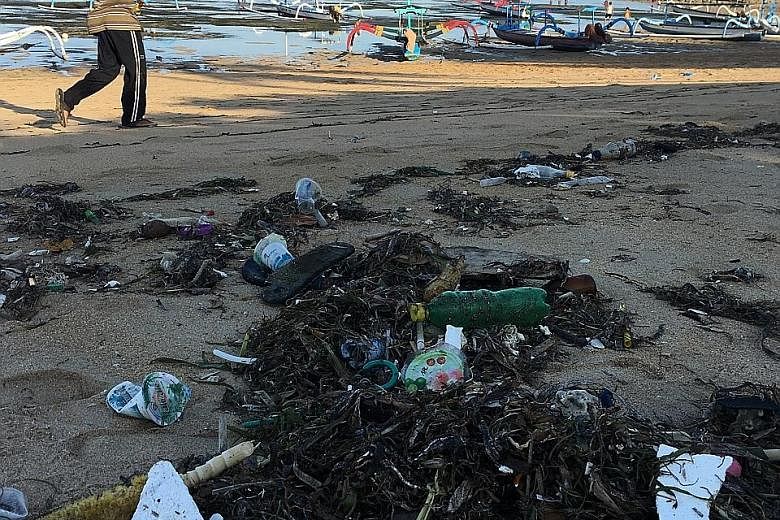NEW YORK • Asian nations responsible for a large portion of the plastic pollution choking the world's oceans have pledged to start cleaning up their act.
At a United Nations (UN) oceans summit in New York, delegates from China, Thailand, Indonesia and the Philippines said they would step up efforts to halt the flow of millions of tonnes of plastic waste into the oceans, the BBC reported.
A 2015 study published in the journal Science estimated that eight million tonnes of plastic waste enter the world's oceans every year. About 60 per cent of this came from five nations: China, Indonesia, the Philippines, Thailand and Vietnam - much of it washed down rivers.
UN officials praised the promises, which are not yet formalised, and which environmentalists say are not nearly urgent enough.
Mr Eric Solheim, the UN's environment director, told BBC News: "There are quite encouraging signs, with nations taking the ocean much more seriously. Of course, there is a very long way to go because the problems are huge."
Ocean plastic waste is becoming an increasingly urgent problem. Plastic pollution affects even the remotest parts of the oceans, clogging reefs and beaches. Seabirds, turtles and other animals also ingest plastic of all sizes, from shopping bags and cigarette lighters to tiny fragments, killing themselves. Some personal-care products contain microplastic beads used as abrasives and these end up in the oceans as well.
Over time, larger plastic items also break up into smaller and smaller pieces, making it easier to be ingested by marine life and also threatening humans who eat plastic-tainted fish and other seafood.
-
60%
Proportion of marine plastic waste each year from five Asian nations, according to a 2015 study.
-
75%
Proportion of marine pollution from land-based sources that comes from just 10 rivers, predominantly in Asia - a study published this year by researchers at the Helmholtz Centre in Leipzig, Germany.
A study published last month said that the beaches of one of the world's most remote islands were covered with the highest density of plastic debris reported anywhere on the planet. Despite being uninhabited and located more than 5,000km from the nearest major population centre, Henderson Island is littered with an estimated 37.7 million pieces of plastic.
Another problem is that no one really knows exactly how much rubbish, and particularly plastic waste, ends up in the oceans every year.
Australia's science agency said yesterday that it will lead a global survey to better assess this problem. China, Indonesia and Vietnam will take part in the project that aims to provide hard numbers on the amount of litter entering the oceans by using data collected on coastlines and from cities across the globe. The United States, South Korea and Bangladesh will also participate.
"Up until now we've been relying on estimates from 2010 World Bank data. So this will be the first time anyone has brought together a group of countries to look at exactly how much litter is entering the oceans," Dr Denise Hardesty, of Australia's Commonwealth Scientific and Industrial Research Organisation (CSIRO), said in a statement.
"We will be able to see where the hot spots lie by looking at how people, wind, the shape of the land and storm water move rubbish into the ocean, and then give advice on how to improve this based on science-based interventions," said Dr Hardesty, a senior scientist with CSIRO's Oceans and Atmosphere Flagship in Hobart.
Yesterday's announcement of the survey, which CSIRO said was the world's largest such study, also came on World Oceans Day, which this year focused on marine plastic pollution.
"We know that almost all litter starts off in someone's hand, and from there it finds its way from land to the ocean, where it breaks up into smaller pieces," Dr Hardesty said in the CSIRO statement.
"This means, if we can stop the rubbish from entering the ocean, we can make real headway in resolving the problem."
A study published earlier this year by researchers at the Helmholtz Centre in Leipzig, Germany, estimated that 75 per cent of marine pollution from land-based sources comes from just 10 rivers, predominantly in Asia. Reducing the amount of plastic in these rivers by half would reduce global plastic waste by 37 per cent, it said.

